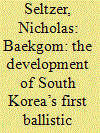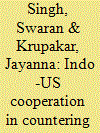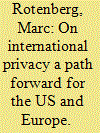| Srl | Item |
| 1 |
ID:
169460


|
|
|
|
|
| Summary/Abstract |
This article traces and analyzes the development of South Korea’s first ballistic-missile system from 1971 through 1978 based on memoirs and personal accounts by scientists and officials directly involved in missile development during this time. The system is often described as a reverse-engineered copy of the Nike Hercules, a US surface-to-air missile, but this description does not capture the true character of South Korean missile development during the 1970s. By working on the Nike Hercules-based design in cooperation with American and French contractors, South Korea’s weapons specialists gained experience and built facilities that underpinned autonomous missile development for decades afterward. The accounts of South Korean weapons scientists also demonstrate that tacit knowledge—subtle or secret methods and tricks transmitted in person from mentors to protégés rather than written down in textbooks or manuals—can play a crucial role in building successful weapons programs and capable research-and-development capacities.
|
|
|
|
|
|
|
|
|
|
|
|
|
|
|
|
| 2 |
ID:
134052


|
|
|
|
|
| Publication |
2014.
|
| Summary/Abstract |
The increasing dependence on Information and Communication Technologies (ICTs) has unleashed a whole new genre of cyber terrorism. Cyber attacks on critical infrastructure, online hate propaganda and use of the internet for recruiting, planning and effecting terrorist attacks have become new frontiers of terrorism. The ubiquitous cyberspace has expanded terrorism structures and transformed their operations. Given their democratic traditions of privileging basic freedoms, such as individual privacy, and the unprecedented spread of the internet, India and the US face a formidable challenge in confronting cyber terrorism. While both countries share a strong political affinity to cooperate and have set up institutional mechanisms to secure cyberspace, divergences in their approaches and a lack of clarity and consensus on their immediate and long-term goals continue to be their fundamental limitations. In spite of their strong commitment to work together, their divergent approaches to internet governance and episodes like the WikiLeaks and Snowden affairs have only re-enforced their continuing trust deficit.
|
|
|
|
|
|
|
|
|
|
|
|
|
|
|
|
| 3 |
ID:
132535


|
|
|
|
|
| Publication |
2014.
|
| Summary/Abstract |
The United States and its closest allies may be on a collision course over the future of privacy in the networked world. Whether leaders are able to find a policy solution will require that they understand the significance of the recent NSA disclosure as well as the development of modern privacy law. Long before a former NSA contractor spilled the secrets about the scope of the NSA's global surveillance, foreign governments worried about the ability of the United States to monitor those living in their countries. The increasing automation of personal information and the technological advantage that the United States enjoyed over other nations was already seen as a problem in the late 1960s. The concerns only increased as Internet-based commerce gave rise to the vast collection and storage
|
|
|
|
|
|
|
|
|
|
|
|
|
|
|
|